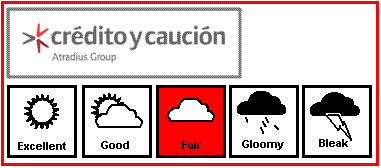| The FIFA World Cup definitely gave a huge boost, not just to South Africa, but to the African continent as a whole, proving that South Africa has what it takes to successfully mount such an event, and instilling a sense of pride in many South Africans. However, while fleetingly shining the spotlight on the nation, it seems to many that the gains were mainly short lived, with the economic benefit of the competition judged to have made only a minimal contribution to South Africas GDP growth. South Africa has one of the most sophisticated business environments in Sub Saharan Africa, underpinning its dominant position in the region. Driving this are its strong state institutions and, until recently, its relative political and economic stability compared to the rest of the region, both of which have helped attract vital foreign investment. 
The immediate impact of the global economic downturn on South Africa was relatively marginal: a contraction in GDP for just three consecutive months. Having introduced the new Consumer Credit Act before the crisis, financial institutions and consumers were already accustomed to tighter lending criteria and regulations, such that the overall impact of the credit crisis on liquidity and consumer debt were largely mitigated in comparison to other countries. Although this paints a relatively positive picture, South Africa is by no means without its problems. Recently, the combination of strikes, a high crime rate, an inflexible labour market and power shortages have made the country less attractive for overseas investors, while the focus of attention created by the World Cup has exposed many of the weaknesses which continue to hamper economic growth. Unequal wealth distribution remains a real issue, as does the very high unemployment rate [25.3% in Q3 of 2010]. Tensions within the African National Congress [ANC] and with the trade unions have led to further unease for investors and uncertainty over policy in the short to medium term. Overall, while South Africa benefits from a strong and established democracy, a number of structural weaknesses still clearly exist. The general consensus is that 2010 will be a reasonable year for the South African economy, as it gradually recovers from the recession. However, growth is not expected to return to pre-crisis rates [4-6% year-on-year], and the IMF has forecast growth of 3% for this year and 3.5% in 2011. Activity in key sectors has decreased over the past quarter, and the outlook for the short term remains pessimistic. Recent trade activity indexes show a marked drop in sales volumes, pointing to a decline in all major components of trade activity. Business confidence fell between March and June 2010 from 43 points to 36 and, according to Statistics South Africa, the number of corporate liquidations rose by 25% year-on-year, demonstrating the challenging trading conditions in South Africa. While investment flows were strong during the build-up to the World Cup, these now appear to have ground suddenly to a halt, making the drop from such a high base all the more dramatic. However, the pessimistic business sentiment is to some extent offset by consumer confidence, which increased in Q3 of 2010. Business opportunities in neighbouring countries With activity in the domestic market currently low, South African businesses are increasingly looking beyond its borders for growth opportunities, and this is where we are likely to see most demand in the coming 12 months. Compared to its neighbours, and despite its political and economic problems, South Africa continues to enjoy relatively healthy demographics, an improving infrastructural base, a manageable debt burden, proven mineral reserves, and a stable banking system, all of which have the potential for it to benefit from the rapid growth expected in neighbouring countries such as Zambia and Angola. From a risk underwriting perspective, South African buyers will have to be financially very strong to withstand the ongoing problems, and cover on unsecured terms will usually be reserved for companies that exhibit a robust liquidity position with good cash flow generation and low dependency on external financing. Financial information is not widely available, so that a direct approach to buyers is often required. Thankfully, business morality generally remains good, and most companies are happy to cooperate when the Atradius Group contacts them for information, especially if the name of the supplier seeking cover can be disclosed. |
